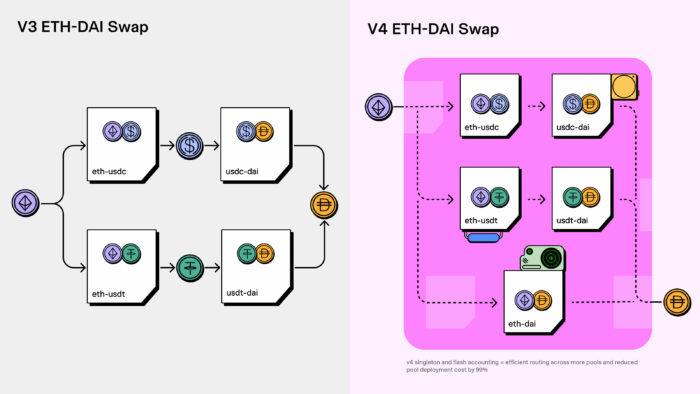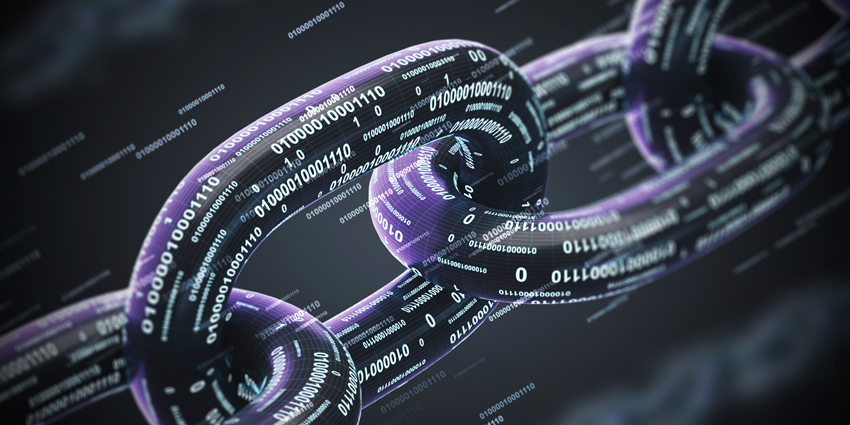Uniswap Reveals v4 Upgrade, Aims to Promote Community Feedback
The Alpha:
- Uniswap Labs has released the draft code for Uniswap v4, introducing unique plugins and custom liquidity pools.
- V4 marks the first time Uniswap Labs has opened up to community feedback before a version’s public launch, illustrating a commitment to a decentralized development model.
- While no official release date for v4 has been announced, the team plans to engage in extensive community interaction and revision of the base code.
Dive deeper
Uniswap Labs, the pioneering team behind the world’s leading decentralized exchange (DEX), has revealed plans for its next major upgrade: Uniswap v4. The June 13 announcement came with the release of the upgrade’s draft code and marks a new approach to creating a more inclusive and decentralized development model.
Considering that the Uniswap protocol has not received a significant update since v3 was deployed to the Ethereum network in May 2021, this latest news feels like a signal of tremendous growth from Uniswap Labs – which has been steadily evolving despite constantly changing crypto and NFT market.
Known for popularizing automated market makers (AMMs), Uniswap has been a major player in the crypto trading landscape, amassing over $1 trillion in cumulative transaction volume with its current version, according to DefiLlama. However, its upcoming iteration aims to surpass this impressive legacy by improving its coin exchange features and introducing custom liquidity pools.
Most notably, Uniswap v4 introduces a unique feature called “hooks”, an innovative new concept that encompasses smart contracts that can be connected to different pools. The feature paves the way for a suite of customizable options, such as on-chain limit orders and dynamic fees – which anecdotally have been difficult to incorporate in a blockchain environment without centralized order books or intermediaries – to be introduced to the platform.
“Hooks are contracts that run at various points in a pool action’s lifecycle. Pools can make the same trade-offs as v3, or they can add completely new functionality,” Uniswap CEO and Founder Hayden Adams said in a blog post. “For example, v4 will allow pools that natively support dynamic fees, add limit orders to the chain or act as a time-weighted average market maker (TWAMM) to spread large orders over time.”

The ability of hooks to facilitate the creation of TWAMMs could be of great importance with this latest update, as it potentially reduces the risk associated with adverse price movements. Essentially, TWAMMs mean that v4 users will be able to execute long-term swaps, where currencies can be converted over a long period of time rather than immediately transferring a token based on current price measurements.
Adam’s blog post also states that Uniswap v4 offers an “improved architecture and gas savings”, potentially presenting a solution to a long-standing challenge for traders – high gas costs. With the use of a “singleton contract”, the new architecture ensures that all pools reside within a single smart contract, thereby significantly reducing gas fees for pool creation, which are expected to be reduced by up to 99 percent. This “flash accounting” method means that only net balances are transferred in and out of pools, further minimizing costs.
A commitment to collaboration
Reflecting its commitment to community-oriented development, Uniswap Labs breaks new ground by releasing the draft code for v4 to encourage public feedback. Adams noted that the open source nature of the code would allow meaningful community input to refine the final product.
The move toward a more participatory model comes at a time of uncertainty in crypto regulation as Binance and Coinbase navigate legal disputes with the US Securities and Exchange Commission (SEC). But perhaps the ongoing SEC situation only highlights Web3’s need for the decentralization ethos that Uniswap seeks to embody.
Uniswap v4 is currently in its formative phase, with the final launch date still undecided. However, the platform’s progressive approach points to a promising future with the potential to redefine the standards for decentralized exchanges.
In case you missed it:
Editor’s note: This article was written by an nft employee in collaboration with OpenAI’s GPT-4.


